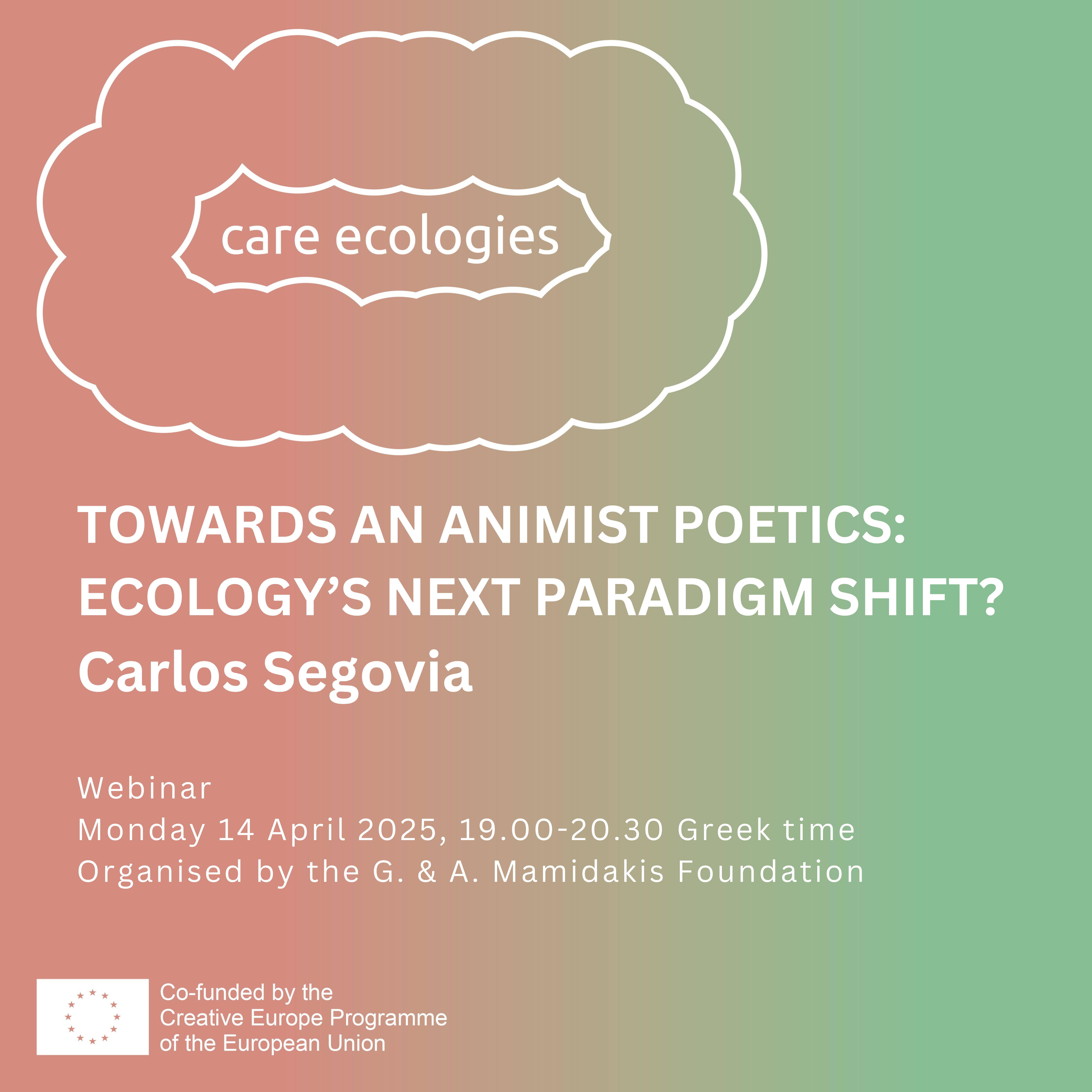Webinar with Carlos Segovia
Monday 14 April 2025, 19.00-20.30 Greek time
Click here to register for the event
The fourth in a series of five online public conferences, organised by the G&A Mamidakis Foundation in the context of Care Ecologies, an ongoing cooperative project among five partners from Greece, Croatia and Spain. Co-funded by Creative Europe. More information about Care Ecologies here.
TOWARDS AN ANIMIST POETICS: ECOLOGY’S NEXT PARADIGM SHIFT?
Are animism and posthumanism coextensive categories? Do both demand a flat ontology? Do they betray the same spirit, the same passion for transversality? Or does their assimilation blur a distinction that ought to be rethought?
Hölderlin’s notes on tragedy (with their discrimination between two degrees of ‘intimacy’ vis-à-vis ‘nature’) might help us recover the sense and the purpose of these questions—not less than Davi Kopenawa’s (a Yanomami shaman’s) differentiation between the ‘forest’ and its ‘image.’ We have lost both, he states. Yet other voices add to this reflection as well: Plato, Blanchot, Derrida, Guattari.
Plato, inasmuch as he discards the One and the Many as plausible points of departure to unravel being’s fluctuation. Blanchot, insofar as he unearths the ambivalence inherent to the human condition. Derrida and Guattari, with their attempts at turning iridescent rather than erasing our notions of the ‘human’ and the ‘non-human.’ They all seem to realize that reality is more than one and less than two, which is, in turn, the axiom at the heart of an animist poetics—a poetics of thresholds, a poetics that challenges mainstream distributions of Life and Non-Life (poetry being liminal by definition).
Care, for its part, is the art of keeping alive what would otherwise be dispersed, extinguished, or rendered indifferent. In this sense, care can also be viewed as an animist practice. But how does this relate to posthumanism? Posthumanism, be it murky (speculative realism) or connective (actor-network theory and new materialism), aesthetic or political, stands on different premises. It aims at de-configuring or re-configuring what animism seeks to re-enchant, even if there is a politics of animism and animism is not alien to the allure of dusk.
Moreover, while posthumanism intends to dissociate the Real from the Symbolic (à la Lovecraft) or wishes to re-arrange their couplings (after Spinoza), animism brings the Imaginary (of which phantasy is a distortion) back to life—in Rilkean fashion. It thereby has the power to push (forward? sideways?) today’s ecological thinking beyond scientific (biological) discourse and rationally based (responsive) ethics, whose shortcomings are quite patent (people know what to do yet do nothing).
Early Greek thought (as reread by Clémence Ramnoux), anthropology (through Barbara Glowczewski’s ethnography on the Warlpiri and Pierre Clastres’s on the Ache), and the visual and performative arts (from Fra Angelico’s frescoes to the indigenous paintings of the late Jaider Esbell, from Yoko Ashikawa’s butoh dance to Mariko Mori’s installations) will guide us here and help us extract the implications. Are we—back now to the idea of thresholds—at the doorsill of ecology’s next paradigm shift?
Carlos A. Segovia is an independent British-born Spanish philosopher based in Berlin and working on questions of contingency and thinkability in a post-nihilistic key. He has been associate professor of philosophy and religious studies at St Louis University Missouri from 2013 to 2024; lecturer in ethics at Loyola University Maryland from 2013 to 2017; visiting professor at the University of Aarhus in 2018 and at the Free University of Brussels in 2019; and, between 2018 and 2025, guest lecturer at the European Research Council in Ghent, the Collège International de Philosophie, the École Normale Supérieure, University College London (UK), Bauhaus-Univeresität Weimar, the Catholic University of Milan, Waseda University Tokyo, Ryukoku University Kyoto, the European University at St Petersburg, Parrhesia Berlin Philosophy School, and the University of Lilongwe, among other institutions.
His publications include Dionysus and Apollo after Nihilism: Rethinking the Earth–World Divide (with Sofya Shaikut; Brill, 2023), Guattari Beyond Deleuze: Ontology and Modal Philosophy in Guattari’s Major Writings(Palgrave Macmillan, 2024), Félix Guattari and the Ancients: Theatrical Dialogues in Early Philosophy (with Gary Genosko; forthcoming with Bloomsbury in 2025), and Nietzsche’s Pre-Dionysian Apollo and the Limits of Contemporary Thought (forthcoming with Peter Lang in 2025).
Online public event organised by the G. & A. Mamidakis Foundation as part of Care Ecologies, a Creative Europe cooperation project with Idensitat, What, How & for Whom / WHW, State of Concept Athens and the Centre for New Media and Feminist Public Practices. Co-funded by Creative Europe.


